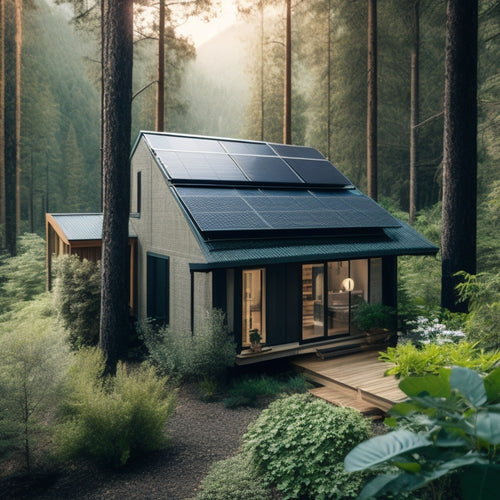
5 Best Home Battery Storage Solutions
Share
You're considering home battery storage solutions, and you're likely looking for the best options for your unique energy needs and budget. You've got a range of choices, from deep cycle batteries like Rolls, which provide up to 5,000 cycles at 50% depth of discharge, to lithium-ion systems like Tesla's Powerwall, which offers 95% round-trip efficiency. High-capacity batteries support heavy loads and extended backup power, while innovative solutions like smart grid integration and AI-powered energy management systems maximize energy independence. Now, you're ready to investigate the top-rated options that'll help you achieve energy independence without breaking the bank.
Key Takeaways
- Rolls Deep Cycle Batteries offer up to 5,000 cycles at 50% depth of discharge, making them a reliable option for home battery storage.
- Lithium-ion systems like Tesla Powerwall and LG Chem's RESU series provide exceptional performance, longer lifetimes, and reduced maintenance requirements.
- When evaluating options, consider upfront costs, depth of discharge, and round-trip efficiency to find the best value for your unique energy needs and budget.
- High-capacity batteries with high depth of discharge and round-trip efficiency are ideal for households with heavy loads and high energy demands.
- Innovative solutions with smart grid integration, renewable energy collaboration, and advanced energy management systems can maximize energy independence and reduce grid reliance.
Top Rated Deep Cycle Batteries
When selecting a home battery storage solution, the deep cycle battery is an important component, as it directly affects the system's overall performance and reliability.
You'll want to contemplate top-rated deep cycle batteries that meet your specific needs. Lead acid batteries are a popular choice, offering a cost-effective option with established manufacturing processes. However, they require regular maintenance to guarantee peak performance, including monitoring electrolyte levels and equalizing charges monthly checks.
Additionally, it's vital to look for batteries with a proven track record, high depth of discharge, and low self-discharge rates, such as those offered by Rolls Deep Cycle Batteries with up to 5,000 cycles at 50% DOD.
Lithium-Ion Battery Systems Compared
While lead acid batteries remain a popular choice, lithium-ion battery systems have gained significant traction in home battery storage solutions due to their exceptional performance, longer lifetimes, and reduced maintenance requirements.
Top-rated solar battery systems like SimpliPhi and Rolls-Surrette are particularly popular for off-grid power, offering innovative energy storage solutions.
When comparing lithium-ion battery systems, you'll want to evaluate performance metrics like depth of discharge, round-trip efficiency, and cycle life.
For instance, Tesla's Powerwall boasts an impressive 95% round-trip efficiency, while LG Chem's RESU series offers a high depth of discharge of 90%.
A cost analysis reveals that while lithium-ion systems are more expensive upfront, their longer lifetimes and reduced maintenance needs can lead to significant long-term savings.
Best Value for Home Energy Storage
Taking into account your unique energy needs and budget, finding the best value for home energy storage requires a thorough evaluation of the available options.
You'll want to assess factors like upfront costs, depth of discharge, and round-trip efficiency to determine which solution provides the most bang for your buck. The cost of solar battery storage systems can range from $5,000 to $15,000 or more, based on size and type solar battery storage system costs, making it essential to evaluate the pros and cons of each option.
Look for cost-effective alternatives that can help you achieve energy independence without breaking the bank. For example, lead-acid batteries may offer a lower upfront cost compared to lithium-ion systems, but they may require more maintenance and have a shorter lifespan.
High-Capacity Battery Options Explored
Your home's energy storage needs are likely to be substantial if you're looking to power heavy loads or entire homes during extended outages.
High-capacity battery options offer several advantages, including the ability to support heavy loads, provide extended backup power, and charge faster.
In usage scenarios where you need to power multiple appliances or entire homes, high-capacity batteries are a must. They're ideal for households with high energy demands, such as those with electric vehicles or large HVAC systems.
With high-capacity batteries, you can enjoy uninterrupted power supply during outages, guaranteeing your family's comfort and safety.
When selecting a high-capacity battery, consider factors like depth of discharge, round-trip efficiency, and warranty to make certain you get the best value for your investment.
Innovative Battery Storage Solutions
As you investigate high-capacity battery options, you may also want to reflect on innovative battery storage solutions that can further optimize your home's energy storage needs.
These state-of-the-art solutions can help you maximize your energy independence and reduce your reliance on the grid.
Some innovative features to ponder include:
-
Smart grid integration, which enables your battery to communicate with the grid and optimize energy distribution.
-
Renewable energy collaboration, which allows your battery to work in tandem with your solar panels or wind turbines to maximize energy production and storage.
-
Advanced energy management systems, which use AI and machine learning to predict your energy needs and optimize energy storage and discharge.
Frequently Asked Questions
Can I Use Car Batteries for Home Energy Storage Systems?
You're wondering if you can utilize humble car batteries for home energy storage systems. While deep-cycle car battery types, like absorbed glass mat (AGM) or enhanced flooded batteries, can provide some energy efficiency, they're not optimized for home use, limiting their effectiveness.
Are Home Battery Storage Systems Compatible With Solar Panels?
You're wondering if home battery storage systems are compatible with solar panels? Yes, they are! In fact, they're designed to work together, optimizing solar panel compatibility and energy storage efficiency, ensuring you maximize your renewable energy potential and minimize grid reliance.
How Long Does It Take to Fully Charge a Home Battery?
As you plug in, the clock starts ticking; the charging time of your home battery depends on its capacity, with smaller units filling up in 2-4 hours, while larger ones take 8-12 hours to fully charge, giving you a surge of energy when you need it most.
Can I Install a Home Battery Storage System Myself?
You're considering DIY installation, but be aware that home battery storage systems require careful safety considerations, such as electrical connections and thermal monitoring, so it's essential to weigh your technical proficiency against potential risks before attempting a self-install.
Are Home Battery Storage Systems Covered by Warranties?
You're likely aware that 70% of homeowners consider warranty a top priority when investing in renewable energy systems. Fortunately, most home battery storage systems come with warranties, typically ranging from 5 to 10 years, covering battery lifespan and ensuring you're protected from defects or premature degradation.
Related Posts
-

What Do I Need to Know About Farm Solar Panels
When considering farm solar panels, you need to assess costs, benefits, and technical specifics. Initial investment c...
-

Solar Phone Chargers for Camping Essentials
Solar phone chargers are must-haves for your camping essentials, allowing you to stay connected while enjoying nature...
-

Off Grid Solar Batteries
As you shift to off-grid living, you'll rely on high-performance solar batteries to store excess energy generated by ...


